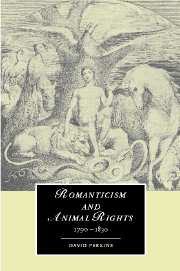Book contents
- Frontmatter
- Contents
- Preface
- Acknowledgments
- 1 In the beginning of animal rights
- 2 Grounds of argument
- 3 Keeping pets: William Cowper and his hares
- 4 Barbarian pleasures: against hunting
- 5 Savage amusements of the poor: John Clare's badger sonnets
- 6 Work animals, slaves, servants: Coleridge's young ass
- 7 The slaughterhouse and the kitchen: Charles Lamb's “Dissertation upon Roast Pig”
- 8 Caged birds and wild
- Notes
- Bibliographical essay
- Index
- CAMBRIDGE STUDIES IN ROMANTICISM
1 - In the beginning of animal rights
Published online by Cambridge University Press: 22 September 2009
- Frontmatter
- Contents
- Preface
- Acknowledgments
- 1 In the beginning of animal rights
- 2 Grounds of argument
- 3 Keeping pets: William Cowper and his hares
- 4 Barbarian pleasures: against hunting
- 5 Savage amusements of the poor: John Clare's badger sonnets
- 6 Work animals, slaves, servants: Coleridge's young ass
- 7 The slaughterhouse and the kitchen: Charles Lamb's “Dissertation upon Roast Pig”
- 8 Caged birds and wild
- Notes
- Bibliographical essay
- Index
- CAMBRIDGE STUDIES IN ROMANTICISM
Summary
On October 18, 1772, church-goers in the parish of Shiplake, in Oxfordshire, were startled to hear a sermon on Proverbs 12. 10: “A righteous man regardeth the life of his beast.” They had not expected their polite and learned vicar, James Granger, to dwell on horses and cows. The sermon “gave almost universal disgust … as a prostitution of the dignity of the pulpit.” When Granger published his sermon, it again proved unpopular. By January 1773, only a hundred copies had been sold. However, it was favorably reviewed in the Monthly Review and the Critical Review – a “sensible discourse,” said the Monthly, a “seasonable and useful sermon,” said the Critical – and his publisher, Davies, assured Granger that “every body speaks well of it.” Granger had wealthy, influential friends and a wide acquaintance among the learned. (He had compiled a Biographical History of England, 1769, which had involved much correspondence.) In the trouble with his congregation, his Bishop was induced to visit Shiplake and support him.
What had Granger said: a “righteous man” thinks himself “allied” to animals; the “meanest creature … has an equal right with himself to live”; in killing an insect “a man destroys what neither he, nor all the united powers of the world can ever repair”; England is “the Hell of Horses,” and “there is no country upon the face of the whole earth … where the beast is so ill treated, as it is in our own.” These are the most extreme passages.
- Type
- Chapter
- Information
- Romanticism and Animal Rights , pp. 1 - 19Publisher: Cambridge University PressPrint publication year: 2003

